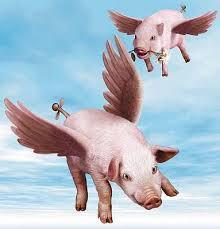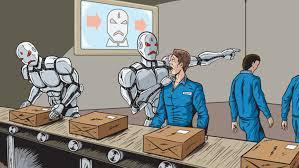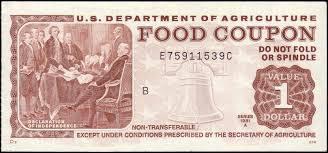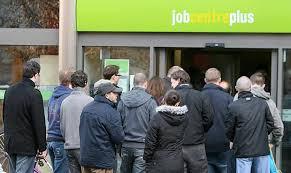 Do you favor a $15 minimum wage? Nobody asks where the money comes from. Heaven, I guess.
Do you favor a $15 minimum wage? Nobody asks where the money comes from. Heaven, I guess.
We’re told that if you give low wage workers more cash they’ll spend it, great for the economy. As though it’s free money.

Or else the money is imagined to come out of business profits. When pigs fly. It will actually come from higher prices. And since low wage industries (like fast food) often serve poorer people, the extra money earned by low wage workers will ultimately come from . . . low wage workers.
Economics 101 says that when prices rise, demand falls. Raise the price of low skilled labor, and businesses will buy less of it. They’ll seek ways to automate instead (more self-service checkout machines if cashiers become too expensive, for example), which is already happening.

People imagine businesses can just pay more because they have profits to spare. In reality, profit margins tend to be pretty thin – like around 3% of sales for supermarkets. There’s no room for fat because in a globalized economy every business competes with every other. McDonald’s doesn’t compete just against Burger King and Wendy’s, but every other food option including home cooking – and indeed against every other conceivable product people could decide to buy in lieu of big macs. So prices must be kept as low as possible. Force prices up, due to higher minimum wages, and a business may become non-competitive. Bye bye jobs.
Yet defying this economic logic, advocates of higher minimum wages claim studies show they don’t actually kill jobs. Maybe so – in the short term at least – and if the rise is small, staying under 50% of median wages. But $15 would double the minimum wage, to 77% of the median. The long term impact on low-skill jobs is frightening.

In fact, higher minimum wages are an ineffective way to combat poverty. The Congressional Budget Office estimates that only 20% of the income benefits would go to those below the poverty line. (Most minimum wage workers are not primary family breadwinners.) So programs like food stamps, and the Earned Income Tax Credit, are much better targeted for helping the poor – without pricing low skill workers out of the market.
But New York State is currently in a paroxysm of political pandering on this issue. Governor Cuomo set up a board to assess fast food minimum wages. Legions of workers duly came and testified that $15 would be peachy. The outcome was pre-ordained. Our local Times-Union has denounced it – because the $15 wage will be phased in, not immediate!
Never mind the absurdity of singling out one category of jobs (and, unfairly, only in chain restaurants). Or how “fast food” can actually be defined.

Politicians in this free-money fantasyland will never have to answer for the economic consequences. Voters won’t connect the $15 minimum wage with unemployment higher than it would otherwise have been. Just as public officials don’t answer for all the other ways they’ve run the state’s economy into a ditch. Indeed, the resulting tough economic conditions just encourage more populist politics, preening “compassion” and doubling down with yet more of the economic follies that got us here.*
I too have compassion for fast food workers, and wish they could earn more. It’s a hard life, and I’m lucky to be spared it. (Though I did work one very crummy job in my teens.) But the answer is not to wave a magic wand and expect Heaven to cough up the cash. Instead it’s to stop making it harder and costlier for businesses to operate.

* Like rent control — more effective than bombing for destroying affordable housing.
